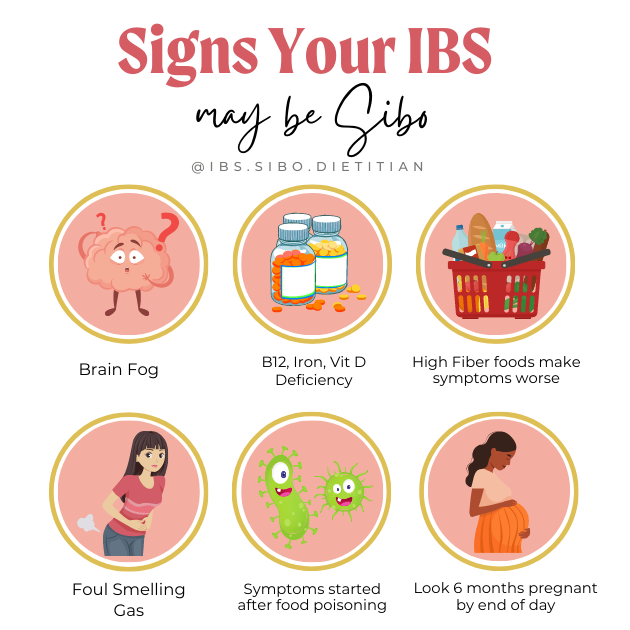You wake up thinking, is this it? Is my bloating finally gone?
Walk straight into the kitchen and take that first sip of water and BOOM, just like that your belly expands to the point that you feel 6 months pregnant.
You have been doing all the right things; low fodmap diet, exercising, adding more and more fiber, and still, like clockwork your belly expands like a balloon with just a drop of water. Your doctors keep telling you, it’s “just IBS” and to maybe try a laxative or anti depressant.
So when is it more than “just IBS?”
“Just IBS”
I want to start by saying, nothing, I mean nothing that you are feeling should be invalidated with the phrase “just IBS.”
IBS is:
- Debilitating pain to the point that you are glued to your heating pad, curled up in a ball.
- Unpredictable bowel habits, making it hard to leave your house
- Missed dates, girls brunch, and travel opportunities
- AND SO MUCH MORE
With the physical and emotional toll aside, IBS is almost always a symptom of the bigger picture. Yes, diets and lifestyle changes can work for some but if you start to look into the root cause, you can peel back those layers to reveal and manage what is really causing your issues.
IBS is a diagnosis of exclusion. But have they excluded everything?
Could Your IBS Actually be SIBO?
Small Intestinal Bacterial Overgrowth (SIBO) is when the bacteria that belongs in your large intestines, overgrows in the small intestines. Now it is important to note that this is not an infection but rather a case of imbalance. In a healthy gut, bacteria resides in your large intestine where it uses the fiber that we eat as fuel to turn it into vitamins, essential fatty acids, and other beneficial byproducts. The small intestine though should be largely sterile. When bacteria builds up, instead of producing beneficial byproducts, gases (hydrogen, methane, and hydrogen sulfide) are produced. These gases lead to many symptoms such as bloating, change in bowel habits, reflux, brain fog, and more.
SIBO symptoms often mimic that of IBS. In fact, up to 30% of IBS has been found to actually be SIBO.
Signs to Look For
Because the symptoms can often overlap, it is good to know what symptoms may set SIBO apart from IBS.
The following that I see most often is
- Feeling 6 months pregnant by the end of the day– the pattern of bloating that is most seen with SIBO is bloating that gets progressively worse throughout the day. You may start off with a flat stomach but then increasingly throughout the day it tends to get worse.
- Brain Fog– Brain fog is a common symptom of SIBO. This can happen for two reasons. The first reason is that when you have sibo, the gases produce gobble up the food that you eat and produce lactic acid. This lactic acid is toxic to your mitochondria and interferes with the production of ATP (energy). The second reason is a immune response that leads to inflammation in the body, including the brain.
- Foul smelling gas or breath – if your gas is consistently smelling like sulfur or “rotten eggs” this usually due to the overgrowth of gases that the SIBO is producing.
- Symptoms started after a GI bug or food poisoning– When you have food poisoning or a GI bug, your body does everything in it’s power to get rid of the toxins. This includes producing antibodies known as antiviculin that attacks the housekeeper of your gut, slowing things
- Fiber makes symptoms worse – Fiber (specifically high fodmap carbohydrates) is the bacteria’s favorite fuel. If this fiber is fueling the large intestines, then we produce beneficial byproducts such as vitamins, essential fatty acids, etc. However, the byproducts of the bacteria in the small intestines are bloating, changes in bowel habits, and gas.
- Symptoms are paired with and vitamin deficiencies and/or malnutrition – Many vitamins are absorbed in the small intestines. If you have SIBO, either the bacteria will gobble up the vitamins that you consume or you will struggle to absorb certain vitamins and minerals due to inflammation. This often leads to deficiencies.

If you suspect you may have SIBO, take the quiz to find out What your bloat is telling you! If you are looking for additional support in how to discover and treat your SIBO, apply to my small group coaching program!










2 Responses
I have bad gas but no smell at all. Not too much bloating but otherwise too much gas.
Even if the gas is odorless, it is still possible to have overgrowth. The slower motility and constipation is what leads to the increase of odorous gas.